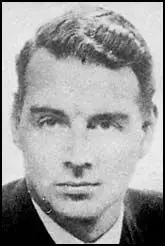 |
Guy Burgess, who along with Donald Maclean, Anthony Blunt and Kim Philby formed the ‘Cambridge Four’, was a British-born Soviet spy who was active during World War Two and the Cold War. For years the treachery of Burgess went unnoticed but warned of his imminent arrest in 1951, he fled to the USSR.
Guy Burgess was born in 1911 in Devonport, Devon. His father was a Commander in the Royal Navy and Burgess consequently had what can only be described as a quintessentially classic middle class education – Eton, Dartmouth Naval College and Trinity College, Cambridge. It was only poor eyesight that ended what was clearly planned for him – a career in the Royal Navy. At Trinity College, Burgess studied Modern History and after graduating in 1933, he held a two-year postgraduate teaching position. While at Trinity, Burgess belonged to the Cambridge Apostles, an elite debating society. One of the members of this society was Anthony Blunt. Blunt had already been recruited by the KGB to identify like-minded people at Cambridge and to Blunt Burgess clearly fitted the bill.
In 1934, Burgess openly renounced communism. However, this was done as a feint to hide his real support for Moscow. He built on this deception by joining the Anglo-German Fellowship, a pro-Nazi group that probably represented everything that Burgess actually detested.
After his time at Trinity, Burgess was employed by the ‘Times’ and the BBC. He also spent some time in Spain during the Spanish Civil War. In 1938, Burgess joined Section D as a propaganda expert and during World War Two he worked in the press department at the Foreign Office. In 1945 he became secretary to the Minister of State for Foreign Affairs, Hector McNeil. In this position, Burgess had access to highly sensitive information that he took home before his work ended so that it could be photographed by his handler and then returned to the Foreign Office the following morning before anyone realised any documents had gone missing.
To the Soviet Union Burgess was a very useful asset. However, he had set in place his own self-destruction. Burgess was an alcoholic and his behaviour could be very unpredictable. In 1950, the diplomat Harold Nicholson wrote:
“I dined with Guy Burgess. Oh my dear, what a sad, sad thing this constant drinking is. Guy used to have one of the most rapid and acute minds I knew. Now he is just an imitation of what he once was.”
While serving at the British Embassy in Washington DC, he openly insulted the wife of a high-ranking CIA official. In an era when it was illegal in the UK to be a homosexual, Burgess was very indiscreet about his private activities.
In October 1951, Kim Philby warned Burgess that MI5 was investigating his activities. In fact, MI5 was concentrating its investigation on Donald Maclean but Burgess believed that he had been brought into this investigation. A KGB controller, Yuri Modin, arranged for both men to defect to the USSR. Burgess resurfaced in 1956 in Moscow.
Burgess never took to the life he faced in the USSR. He never bothered to learn Russian and his alcoholism got out of control. Burgess died from alcohol related illnesses in 1963 aged 52.